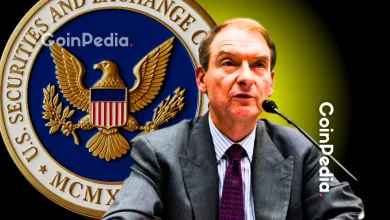
Trump’s pro-crypto moves, including Bitcoin reserve, face setback without Congressional backing.
GENIUS Act stablecoin bill collapses as Democrats cite AML, KYC concerns.
Bitwise’s Hougan warns political gridlock could trigger summer crypto market volatility.
The $2.8 trillion crypto market could be headed for a rough summer and not because of Bitcoin’s price swings. According to Bitwise CIO Matt Hougan, the real threat isn’t market volatility, but political inaction in Washington.
In a sharply worded blog post, Hougan warned that despite bullish momentum – from Bitcoin’s recent all-time high to the Trump administration’s pro-crypto stance – regulatory indecision could throw cold water on the rally.
Even a single bill passed into law, he says, could lock in political support and ensure crypto’s continued ascent.
Trump’s Crypto Playbook: Big Promises, No Guarantees?
Hougan applauded several bold moves by the current administration. These include:
- Proposing a strategic Bitcoin reserve,
- Declaring digital assets a national economic priority, and
- Scrapping SEC restrictions like the controversial SAB 121.
Add to that the appointment of Paul Atkins as SEC Chair and David Sacks as the White House’s “crypto and AI czar,” and it’s clear the executive branch is putting its weight behind the digital asset revolution.
But Hougan isn’t convinced it’s enough. Without bipartisan legislation, these advances remain vulnerable to the next political shift.
Who Can Derail Crypto? Hougan Answers!
Hougan’s blunt answer to what could halt crypto’s growth?
“People can derail crypto. More preciously, the Politicians could derail crypto,” he wrote, highlighting the need for bipartisan legislation to lock in progress.
His concern is about Congress missing the moment. Despite regulatory rollbacks and favorable appointments, nothing is set in stone without legislative action. A lasting framework is the only way to protect these gains and build long-term confidence, especially among institutional investors.
Stablecoin Bill Hits a Wall
One bill in particular has captured attention: the GENIUS Act, a stablecoin framework backed earlier by Coinbase CEO Brian Armstrong. It made surprising headway in March, clearing the Senate Banking Committee with rare bipartisan support.
But by early May, momentum collapsed. 9 Senate Democrats pulled their support, citing concerns over anti-money laundering (AML) and know-your-customer (KYC) measures.
Hougan believes this sudden reversal has more to do with political calculations than actual policy flaws. He also cautioned that combining stablecoin regulation with broader market reforms is a risky bet.
“This is the perfect example of the enemy of the good,” he noted.
Why It Matters for Bitcoin and Altcoins
Despite the regulatory roadblocks, Hougan remains firmly bullish on crypto’s future. He’s forecasting fresh all-time highs not only for Bitcoin, but also for Ethereum (ETH) and Solana (SOL).
But here’s the catch: without legal clarity – especially around stablecoins and market structure – institutional capital may stay on the sidelines. That means fewer inflows, more volatility, and potentially, a delayed or diluted bull run.
Never Miss a Beat in the Crypto World!
Stay ahead with breaking news, expert analysis, and real-time updates on the latest trends in Bitcoin, altcoins, DeFi, NFTs, and more.
One bill could make crypto history. Inaction could make it bleed.
FAQs
Without bipartisan laws, crypto progress remains fragile and vulnerable to political shifts or reversals.
Lack of legal clarity may keep institutions away, reducing inflows and weakening bullish momentum.








